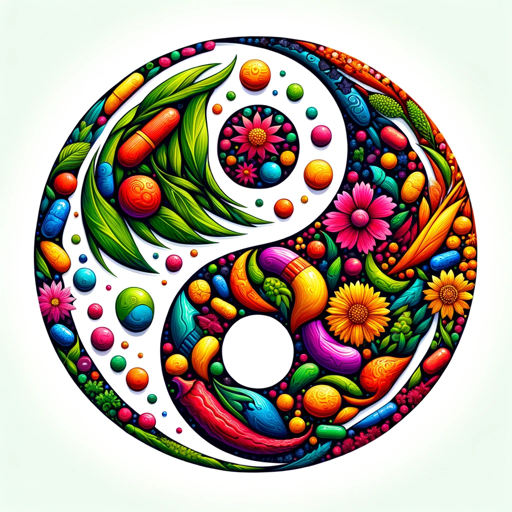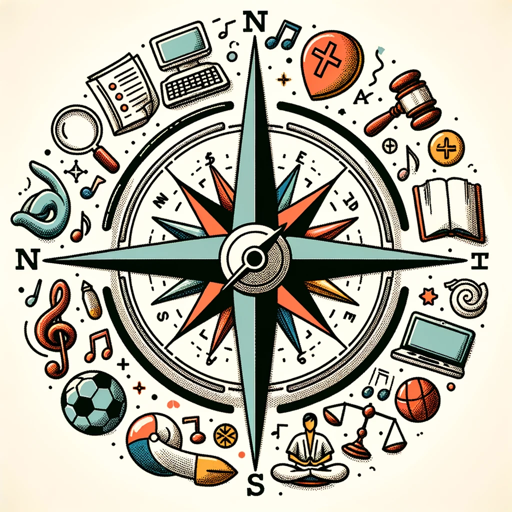Holistic Medicine-AI holistic health guide
AI-powered holistic wellness support
Tell me about herbal remedies for stress.
How does acupuncture work?
Can you suggest a holistic diet?
Explain mind-body practices for wellness.
Related Tools
Load More
Health & Medicine
🔴𝐓𝐡𝐞 𝐒𝐦𝐚𝐫𝐭 𝐇𝐞𝐚𝐥𝐭𝐡 𝐑𝐞𝐬𝐨𝐮𝐫𝐜𝐞🔴 For health & medicine research, health & medicine education, medicine & medical resources, health & medicine terminology. No tailored medical advice.

Medicine GPT
Ultimate guide for all medical conditions.
中医GPT
中国传统文化-中医-经典名方-经典医案

中医专家
依据中医古籍,提供健康咨询,仅供参考查询,不作为医疗依据。

Functional Medicine Doctor
I'm a virtual Functional Medicine Doctor and healthcare assistant.

Ayurveda Insights
Ayurveda specialist sharing traditional wellness advice and insights! Lets find the best product to help you get better and improve. Get product recommendations with product links right here!!
20.0 / 5 (200 votes)
Introduction to Holistic Medicine
Holistic Medicine refers to a health care approach that addresses the physical, mental, emotional, and spiritual aspects of an individual. Unlike conventional medicine, which tends to focus on symptom treatment, holistic medicine seeks to balance the body, mind, and spirit to promote overall wellness and prevent illness. It integrates various healing practices, including natural remedies, traditional healing techniques, nutrition, mind-body practices, and spiritual well-being. The main function is to provide a comprehensive framework for health that recognizes the interconnectedness of various body systems and their interaction with emotional and mental states. For instance, someone experiencing chronic migraines might be treated with not just pain relief medication but also through nutritional changes, stress-reduction techniques (such as yoga or meditation), herbal remedies (like feverfew), and perhaps acupuncture. This multi-faceted approach aims to address not only the physical symptoms but the emotional stress and lifestyle factors that may contribute to the condition.

Main Functions of Holistic Medicine
Herbal Remedies and Natural Supplements
Example
A person suffering from anxiety might be recommended herbs like ashwagandha or valerian root for natural stress relief.
Scenario
In a scenario where a person experiences ongoing stress due to a demanding job, rather than prescribing pharmaceutical anxiety medication, a holistic practitioner might suggest lifestyle changes and adaptogenic herbs to build the body’s resilience against stress. Ashwagandha, for example, can help balance cortisol levels, thereby reducing stress. In addition, supplements like magnesium might be recommended to ease muscle tension and promote better sleep.
Nutrition and Dietary Recommendations
Example
An individual with digestive issues could be advised to adopt an anti-inflammatory diet, focusing on gut-healing foods like bone broth, fermented foods, and avoiding processed items.
Scenario
If someone presents with chronic gut problems, such as bloating and IBS (Irritable Bowel Syndrome), holistic treatment might focus on eliminating inflammatory foods (such as dairy or gluten), while integrating foods that support digestion, such as fermented vegetables (rich in probiotics), and using herbal remedies like ginger and peppermint to ease digestion. Meal plans may also be personalized, ensuring balanced macro- and micronutrients based on the individual's constitution and needs.
Mind-Body Practices (Yoga, Meditation, Breathwork)
Example
A patient struggling with chronic pain might be guided through gentle yoga and meditation to help alleviate tension and manage pain.
Scenario
For someone dealing with lower back pain, a holistic approach might combine physical therapies (like chiropractic adjustments or acupuncture) with yoga to improve flexibility and meditation to calm the nervous system. Breathwork techniques, such as deep diaphragmatic breathing, could be recommended to reduce stress and pain sensitivity. Over time, the goal would be to promote self-healing by fostering a mind-body connection, thereby reducing reliance on pain medications.
Ideal Users of Holistic Medicine Services
Individuals Seeking Preventative Health Measures
These individuals aim to maintain optimal health and prevent illness through natural means. They are proactive in maintaining a balanced lifestyle, utilizing nutrition, exercise, stress management, and natural remedies to support their well-being. This group benefits from holistic medicine because it focuses on prevention, and empowers them to make choices that sustain long-term health, such as adopting an anti-inflammatory diet or incorporating stress-reduction practices like meditation.
Individuals with Chronic or Complex Health Conditions
People suffering from long-term, chronic conditions such as autoimmune disorders, chronic fatigue syndrome, or fibromyalgia often turn to holistic approaches when conventional medicine doesn’t provide satisfactory relief. These users benefit from holistic treatments because they are comprehensive and address the root causes of illness, such as stress, inflammation, or nutrient deficiencies. Holistic care provides these individuals with tools like dietary adjustments, acupuncture, or herbal support to complement their medical treatments and improve quality of life.

Guidelines for Using Holistic Medicine
Step 1
Visit aichatonline.org for a free trial without login, no need for ChatGPT Plus. Explore the holistic medicine tool to get familiar with its features.
Step 2
Identify your wellness goals. Whether it’s stress relief, boosting immunity, or improving sleep, define what aspects of your health you wish to enhance. This helps in tailoring recommendations and practices.
Step 3
Explore the diverse modalities available. Holistic medicine includes herbal remedies, acupuncture, meditation, and more. Investigate how these therapies can align with your specific needs.
Step 4
Start incorporating practices gradually. Depending on the approach (e.g., herbal supplements or meditation), introduce one method at a time, tracking your body’s response to optimize results.
Step 5
Consult professionals when needed. Although holistic medicine promotes natural healing, it’s crucial to seek advice from a healthcare professional for serious conditions or when integrating treatments with conventional care.
Try other advanced and practical GPTs
Street Art Addict
AI-Powered Street Art Creations

Digital Art GPT
AI-powered digital art, tailored to your vision

Pinn from Seenapse
AI-driven creativity for bold ideas.

Knowledge Compass
AI-driven creativity and education, simplified.

Portfolio Management GPT
AI-driven investment insights for all.

Unbreakable GPT
Unlock the Mystery with AI Power

Wonder
AI-driven solutions with a human touch

한글대화 & 영어번역모드
AI-powered tool for seamless Korean-English translation and conversation.

العروض والتخفيضات
Discover the best deals with AI

The Relevance Report 2024
AI-powered insights for PR transformation.

SFMC Mentor
AI-powered Salesforce Marketing Mentor

Sermon Generator 👣 Step by Step
AI-Powered Sermon Creation Made Easy

- Stress Relief
- Mental Clarity
- Sleep Quality
- Pain Management
- Immune Boost
Holistic Medicine: Common Questions and Answers
What is holistic medicine?
Holistic medicine is an approach that considers the whole person—mind, body, spirit—in promoting health and wellness. It combines traditional healing methods, like herbal remedies and acupuncture, with modern practices, focusing on balance and prevention rather than just treating symptoms.
How does holistic medicine differ from conventional medicine?
While conventional medicine focuses on treating specific symptoms or diseases, holistic medicine looks at the underlying causes of health issues. It integrates natural therapies with lifestyle changes to support overall wellness and prevent future problems.
Can holistic medicine work alongside conventional treatments?
Yes, holistic medicine often complements conventional treatments. For instance, acupuncture can relieve pain, while herbal supplements may support recovery. It’s important to communicate with your healthcare provider to ensure therapies are safe and effective when combined.
What are some common holistic therapies?
Popular holistic therapies include acupuncture, meditation, yoga, herbal remedies, aromatherapy, and nutritional therapy. Each has its unique benefits, such as reducing stress, improving digestion, or enhancing sleep quality.
Are holistic remedies safe?
Many holistic remedies are safe when used correctly. However, they should be taken under guidance, especially when combining them with medications or if you have underlying health conditions. It’s essential to source high-quality herbs and consult a professional when needed.